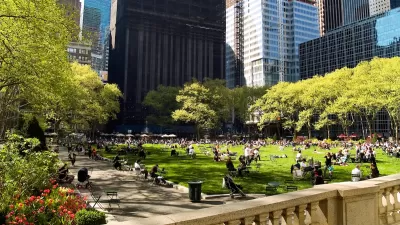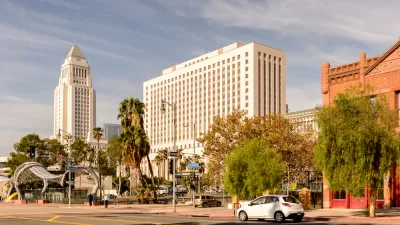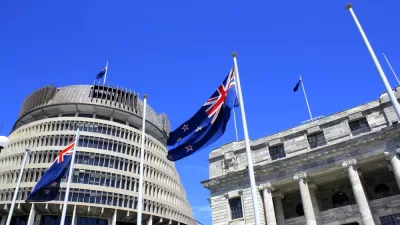During Tregoning's seven years at the helm of the Washington, D.C. Office of Planning, she pushed the city to adopt smart-growth policies touching all aspects of life--not just land use, but transportation, the economy, and more.
Elevation DC: I can't believe you're leaving.
HT: Me either. It’s breaking my heart a little bit to leave. I love this job.
What would you say is your biggest accomplishment as planning director?
Nothing I’m going to tell you was the work of me alone by any means. I really feel like I was fortunate to be in the city with a set of colleagues at a particular time where some significant change was possible. I think we fully became a multimodal city during my time here. And the transportation choices have just multiplied enormously in D.C., and I’m really proud of that whether it’s bikeshare, additional carsharing options, whether it’s the many coming miles of streetcar lines.
Those are all things I didn’t have a singular hand in, but I certainly did my part to encourage those things and push them along and make sure we had supportive land use that really makes that possible. I think having convenient, walkable neighborhoods where you can meet a lot of your daily needs is a huge part of the transportation solution. And that’s something that transportation officials throughout the region now routinely say, that yes, land use is an important part of transportation.
What about your biggest regret?
I have some unfinished business, I won’t call it a regret. The change we’ve seen in transportation is an example of the kind of pace of change coming to cities all across America, and one of the biggest changes is really what’s happening in our economy.
I think cities have a lot to say about that, whether it’s with their land use, whether it’s about how to fund infrastructure. A great example is the Clean Rivers Project that DC Water is working on. We’ve been very supportive of the idea that instead of using these big pipes to deal with our combined sewer overflow issues—One solution is to build, the technical term is to build ginormous pipes underground that will allow that stormwater to be stored and treated later. Those pipes are fantastic. We’ve committed in our city to spend $4 billion on this, but the pipes, all the labor, all the materials, all the equipment comes from outside our economy and when they’re done, the 80-plus days of the year when it rains more than a quarter of an inch those pipes will be of some use.
But if we build green infrastructure instead, we’ll have a cooler city, a shadier, more pleasant city. We’ll have more habitat for birds and wildlife. We’ll have more parks, we’ll have more green space. We’ll also have the jobs that come with that that aren’t high barrier to entry. We’ll have the ongoing need to maintain these things, which also provides employment.
That seems to me like a better kind of solution, especially when that type of job is the thing that’s disappearing from our economy. If we get the jump on this, every other place in the country is headed in this direction so we also create an export economy in services. That idea, that urban places can really take the lead in creating jobs and restructuring economies to benefit existing residents, I think that’s a major challenge that’s facing all cities and that’s something I hope to work on in my new job.
FULL STORY: Harriet Tregoning to leave Office of Planning: the Elevation DC exit interview

Maui's Vacation Rental Debate Turns Ugly
Verbal attacks, misinformation campaigns and fistfights plague a high-stakes debate to convert thousands of vacation rentals into long-term housing.

Planetizen Federal Action Tracker
A weekly monitor of how Trump’s orders and actions are impacting planners and planning in America.

In Urban Planning, AI Prompting Could be the New Design Thinking
Creativity has long been key to great urban design. What if we see AI as our new creative partner?

Portland Raises Parking Fees to Pay for Street Maintenance
The city is struggling to bridge a massive budget gap at the Bureau of Transportation, which largely depleted its reserves during the Civd-19 pandemic.

Spokane Mayor Introduces Housing Reforms Package
Mayor Lisa Brown’s proposals include deferring or waiving some development fees to encourage more affordable housing development.

Houston Mayor Kills Another Bike Lane
The mayor rejected a proposed bike lane in the Montrose district in keeping with his pledge to maintain car lanes.
Urban Design for Planners 1: Software Tools
This six-course series explores essential urban design concepts using open source software and equips planners with the tools they need to participate fully in the urban design process.
Planning for Universal Design
Learn the tools for implementing Universal Design in planning regulations.
Gallatin County Department of Planning & Community Development
Heyer Gruel & Associates PA
JM Goldson LLC
City of Camden Redevelopment Agency
City of Astoria
Transportation Research & Education Center (TREC) at Portland State University
Jefferson Parish Government
Camden Redevelopment Agency
City of Claremont





























